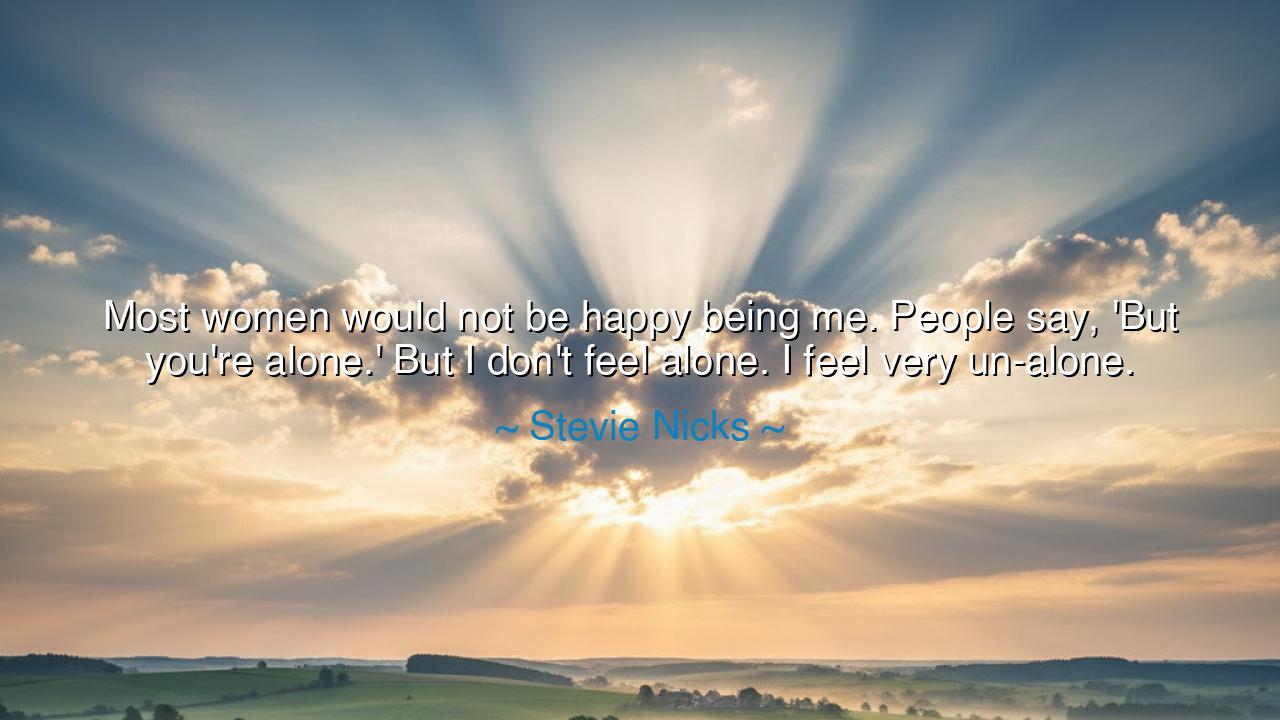
Most women would not be happy being me. People say, 'But you're
Most women would not be happy being me. People say, 'But you're alone.' But I don't feel alone. I feel very un-alone.






“Most women would not be happy being me. People say, ‘But you’re alone.’ But I don’t feel alone. I feel very un-alone.” — thus spoke Stevie Nicks, the mystical voice of a generation, the poet of the moon and the storm. In these words, she reveals a truth that defies the shallow measures of happiness and love. For in a world that worships companionship and fears solitude, she stands as a living paradox — a woman who has found wholeness within herself, who has made peace with the vast quiet of her own spirit. Her words shimmer with the wisdom of one who has walked through fame, heartbreak, and time itself, and emerged not empty, but luminous.
Stevie Nicks, known to the world as the ethereal heart of Fleetwood Mac, has lived a life most only dream of — a life woven with music, love, loss, and legend. Yet beneath the glitter of fame, she speaks here not of luxury, but of independence — of the sacred art of being alone without loneliness. Her quote was born not from isolation, but from realization: that solitude, when embraced, becomes not a prison but a sanctuary. She calls herself “un-alone” because she is surrounded — not by people, but by presence: her memories, her music, her purpose, and the great, quiet company of her own soul.
To say “Most women would not be happy being me” is not pride — it is compassion. She recognizes that her path, though glorious, has been solitary. Love came and went; fame demanded sacrifice. But rather than mourn what she lacked, she chose to celebrate what she possessed — the freedom to create, to dream, to live by her own rhythm. In this, she stands among the timeless company of women who chose the solitary road to greatness — Joan of Arc, who marched to war with no man beside her; Emily Dickinson, who found entire worlds in the confines of her room; Frida Kahlo, who painted her pain into immortality. Each of them, like Stevie, discovered that true connection is not measured by bodies nearby, but by the fire within.
To feel “very un-alone” is to understand that the soul, when awakened, needs no constant witness. There are those who live surrounded by others and yet ache with emptiness, and there are those who walk through silence and feel accompanied by eternity. Stevie’s words teach that aloneness is not the absence of others, but the presence of self. To reach that place requires courage — the courage to face one’s own depths, to listen to one’s thoughts without distraction, and to stand in one’s truth without apology. Few dare to do it, and fewer still find peace in it. But those who do, as she has, discover a freedom beyond description.
Her life is not a hymn to loneliness, but to authenticity. In her solitude, she wrote the songs that defined a generation — Landslide, Dreams, Rhiannon — each born from the secret chambers of her heart. These were not the works of a lonely woman, but of one deeply attuned to the unseen symphony of her own being. When she says she feels “un-alone,” she is speaking the language of the mystic — one who feels the invisible threads that bind her to all things: to art, to spirit, to the great unfolding of life. She is never truly alone, for she has found communion with the infinite.
This truth, though wrapped in the garments of music, belongs to every human heart. To be alone is not to be forsaken — it is to stand at the threshold of one’s own power. Solitude is the forge where strength and vision are tempered. Those who fear it remain forever dependent on others for meaning; those who embrace it learn to draw from the wellspring within. The heroes of every age — prophets, poets, warriors, dreamers — have walked this same path of silence and self-discovery. To feel “un-alone” in solitude is the mark of one who has mastered her own spirit.
Lesson: Seek not constant company, but inner communion. When the world tells you that to be alone is to be incomplete, remember that your spirit was born whole. Do not fear your own presence. Fill your solitude with creation, reflection, and gratitude. Let your silence speak to you. When you can sit alone and feel surrounded by purpose, love, and peace — when you can feel “very un-alone” — you will have found the deepest freedom there is.
Thus, the words of Stevie Nicks are not a lament, but a blessing. They call us to shed the illusion that fulfillment depends on others, and to reclaim the sacred art of solitude. For the one who learns to be un-alone in their own company becomes unshakable — a being of light and song, at home in the vast cathedral of their own soul.






AAdministratorAdministrator
Welcome, honored guests. Please leave a comment, we will respond soon